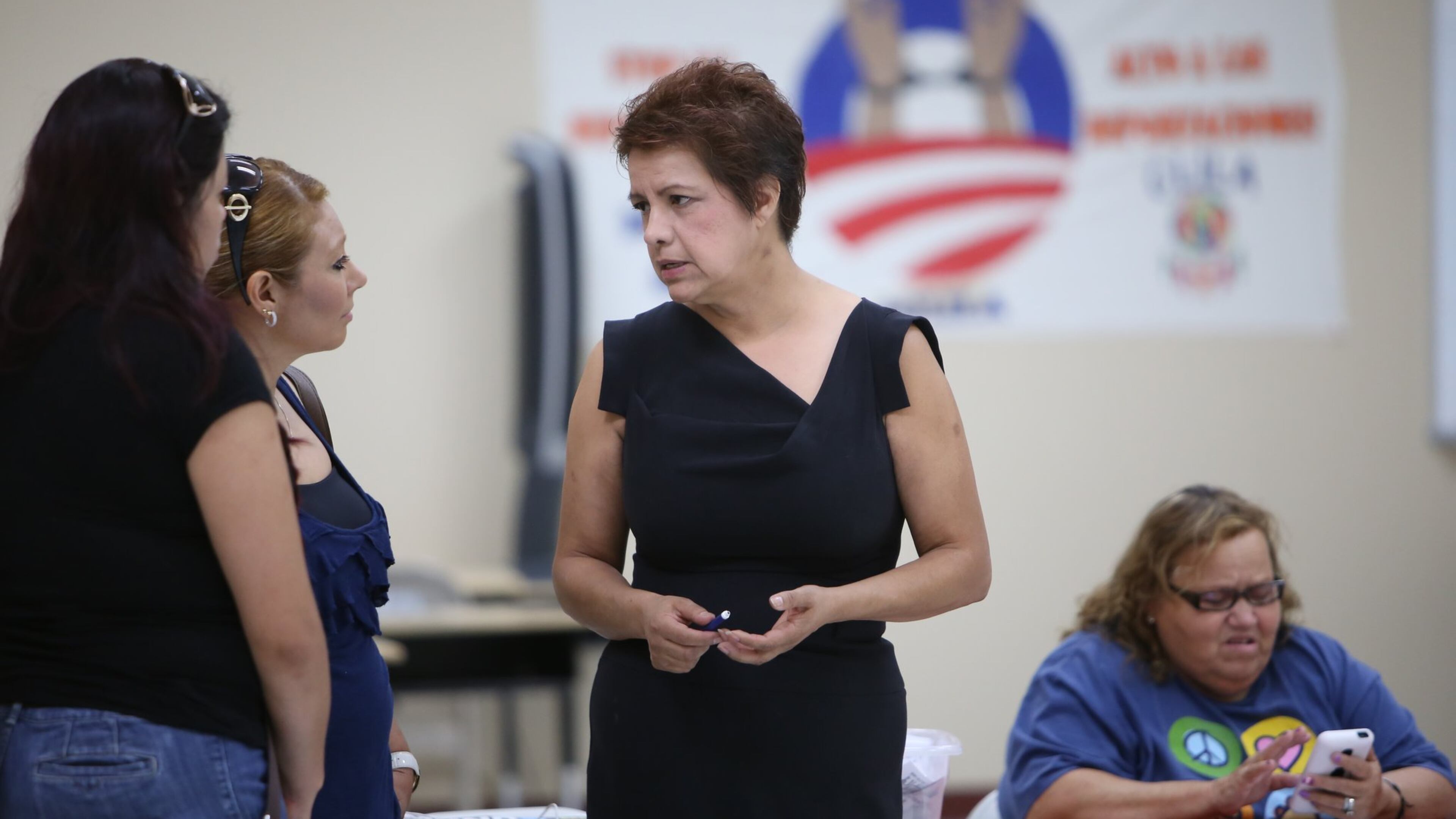Latinos find their political voice, but slowly

AJC data specialist Jeff Ernsthausen and reporter David Wickert contributed to this article.
Standing in a packed gymnasium at a downtown Atlanta recreation center, Maria Olalde watched the stage with pride. A few yards away, her daughter was owning the political spotlight, speaking in advance of First Lady Michelle Obama and two of the nation's highest-profile Democratic candidates.
Eighteen-year-old Ariana Olalde was undoubtedly chosen for several reasons: She’s a standout freshman at Georgia Tech, a newly registered and fired-up voter, female and Hispanic.
“Latinos are on the rise” in Georgia, announced the news site Politico last month. It’s a common refrain among politics-watchers, who sometimes suggest that demographic upheaval could help elect Democrats Michelle Nunn and Jason Carter, and, in Politico’s words, “potentially reshape the national political landscape.”
But beneath the headlines lies a more tempered truth: a Hispanic electorate much smaller than sheer population figures might suggest and constrained by cultural expectations that don’t always include voting.
So who will exemplify the Hispanic political reality more? Ariana, suddenly touching the inner circle of the President of the United States? Or Maria, her mother, who in more than a dozen years as a U.S. citizen, parent, taxpayer, community volunteer and even a government worker, has never stepped into a voting booth?
“I do think we’re going to see change,” said Alan Abramowitz, a professor of political science at Emory University. “Over the next 10 years we’re going to see, I think, a pretty significant change.”
To get there, though, activists will have to convert a silent majority of Latino non-voters.
More than a numbers game
Latinos now make up 9 percent of Georgia’s population. But fewer than one in three of those people are citizens of voting age, according to the latest census estimates. That’s roughly 273,000 potential voters.
Measuring how many of those potential voters are registered is an imprecise science at best. The Secretary of State’s office has put it at about 111,000, based on the boxes people check on their registration forms. An Hispanic advocacy group searched voter rolls for Hispanic names, coming up with a bigger figure: 184,000.
Taking the higher number, Hispanics make up roughly 3 percent of the Georgia electorate. Small as that is, they are the state’s fastest growing voter group. In less than a decade they have more than doubled their percentage of the electorate and more than tripled their voter numbers.
That gives America Gruner hope. She is convinced that Latinos in Dalton are suffering for their ethnic origins and that political power is the way to stop it.
She also knows, from experience, that instilling political participation as a cultural value can take years of hard work.
As the immigration debate roared eight years ago, Dalton was operating road checkpoints — for traffic safety, city officials stress. The checkpoints snare immigrants who lack licenses, and those who enter the country illegally face deportation.
Gruner asked the Latino business community to say something to city government, but in vain. So she started CLILA, which in English is the Coalition of Latino Leaders.
“I see the injustices and the pain in the community and I cannot stay quiet,” she said.
The impediments to voting are as real as the pain, however.
Even among Latinos who are citizens, many are first-generation immigrants concerned primarily with holding a job and creating a stable life.
“I’m not too involved in government,” said Maria Olalde. “I’m involved in everything my kids do,” she explained, as well as working three jobs and volunteering. Recalling the rally at which her daughter spoke, she said haltingly, “They were — Dem? — ocrats?”
No farm team
Immigrants may come from countries where democracy is a farce. They may feel the U.S. system is not for them, especially if they don’t encounter voting information printed in Spanish.
The Voting Rights Act requires dissemination of materials in a foreign language only where a significant fraction of the population is non-English speakers who are eligible to vote. That's a requirement rarely met in Georgia, even in immigrant havens such as Gwinnett County.
Finally, in a sort of Catch-22, without a voting bloc to help carry them to victory, Hispanic candidates are rare, and issues vital to Hispanics are seldom at the forefront in local races. Which gives Latino citizens even less motivation to engage.
In an ideal world, there might be no link between the race and ethnicity of voters and the race and ethnicity of the people elected to represent them. But that is not yet the world Georgians live in.
An analysis over the last year by The Atlanta Journal-Constitution found that in solidly white-majority counties (where at least 55 percent of the county is white), whites held 98 percent of county commission and school board seats. In solidly black-majority counties, black officeholders held 84 percent of the seats.
Hispanics, who do not make up a majority in any of the hundreds of county districts, are stunningly underrepresented in Georgia government.
Of more than 1,700 commissioners and school board members in Georgia’s 159 counties, the AJC found only two who identified as Hispanic, in Muscogee and Evans counties. A third, in Stephens County, had Hispanic heritage but said she did not consider herself Hispanic.
That’s especially significant because town and county races are the machine that hones busybody parents, neighbors and business owners into elected officials — who are then ready to run for higher offices like the state Legislature, and so on up the ladder to Washington. Hispanics in Georgia don’t have a farm team.
Even so, Gruner, the Dalton activist, said she’s seen the political landscape change, little by little.
“It’s been less effort to find voters,” said Gruner, who used to trawl Walmarts and city streets, begging people to sign up. “Now, even last year, they started asking us, ‘Where can I register to vote?’”
The hottest button
The biggest push may come from their staunchest opponents.
Gruner and other Latinos interviewed can summon several issues that matter to them: support for more public transportation, for instance, or education funding. And research shows that jobs and education rank highest as issues among Latinos who are registered voters, just as they do among other voter groups.
The Georgia Republican Party’s new director of minority engagement, Leo Smith, points to that research. “Immigration is third or fourth on the list,” he said.
But in interviews for this story, the issue instantly on many Latinos' lips, lighting their eyes and tensing their muscles, was immigration enforcement. And research shows it is an especially potent issue among those who haven't previously voted.
“It’s a subject that hits home for the majority of these folks,” said Camilo Forero, a Colombian senior at Kennesaw State University who is on the path to U.S. citizenship and is already a Democratic activist. “It’s family members, it’s friends, it’s just immediate relation to the subject.”
When Daisy Hernandez encounters Hispanics who say voting isn’t important, she has a simple message for them: “No, it is important.”
Her parents were each detained within one week of each other, caught in roadblocks in Dalton. Hernandez, 29, was left to care for her young brother, who has a serious heart condition. She is cashing out her 401(k) to try to bring her mother back into the country.
Hernandez said Latinos simply don’t learn as a culture that voting is a responsibility and a way to change their lives. “That’s why we fail as a community.”
Immigration may be the one issue capable of turning non-voters into voters. Yet it's an issue fraught with complications, even for Democrats who support immigration reform. This summer, President Obama postponed executive action he had promised, reportedly because Democratic candidates feared that such action would hurt their chances by enraging the Republican base.
Many Latinos expressed bitter disappointment at the president’s retrenchment.
Still, listening to Michelle Obama recount previous narrow election results, Maria Olalde realized that her vote might have made a difference in the immigration issues tearing up her community. She said she’s going to try to learn the candidates and register in time to vote in November.
Turn signal
If Latinos do surge to the polls, there’s no law that says they’ll vote Democratic. Republicans make the argument that Latinos are a natural fit for their party when it comes to conservative family values.
David Casas, who represents Lilburn in the Legislature, is a Republican. His parents fled communist Cuba. He did not return calls seeking an interview for this article.
Smith, the Republican operative, said Democrats shouldn't assume too much. "The assumption is that we're going to see an increase in Latino voters," Smith said. "But the assumption is also that they're not going to make educated choices, they'll just follow the crowd." The GOP is working to educate them, he said.
If the past is any guide, though, greater Hispanic participation will be good news for Democrats, whose stances on economic issues and the status of immigrants have proven more appealing to Latino voters.
At the Democratic National Committee’s summer meeting, held in Atlanta, the head of the party’s voter expansion project, Pratt Wiley, said demographic changes and Latino outreach can “absolutely” tip Georgia blue by 2018.
“When I look at Georgia what I see is the same trend line that we saw in Virginia, the same trend line we saw in North Carolina,” Wiley said. Georgia is one of three states, he noted, along with Texas and Arizona, that the party is “committed” to turning and making a bellwether for the nation.
Abramowitz, the Emory political scientist, agrees with Wiley’s prognosis but not necessarily his timetable.
Watch, he said, for the moment when Hispanic voters make up perhaps 10 percent or a bit more of the state’s voters. At that point, he said, “it becomes a swing vote potentially in statewide races, even in congressional and legislative districts.”
That won’t happen by 2018, in his view, but it could happen as early as 2020.
Only, though, if activists such as CLILA’s Gruner can reach people like Jose Hernandez. Interviewed right outside the Dalton grocery store where CLILA’s offices are located, Hernandez showed how tough that may be.
A 74-year-old semiretired bakery truck driver in Dalton, he said he acquired legal status through the Reagan amnesty. For more than 20 years he has meant to apply for citizenship and vote, but never gets around to it.
“Every year I say next year,” he said, speaking in Spanish.
In the meantime, he has no truck with politics. He concentrates instead on family, his modest enjoyments and avoiding problems with the government, he said.
“For me the world can go around and I live my life.”



